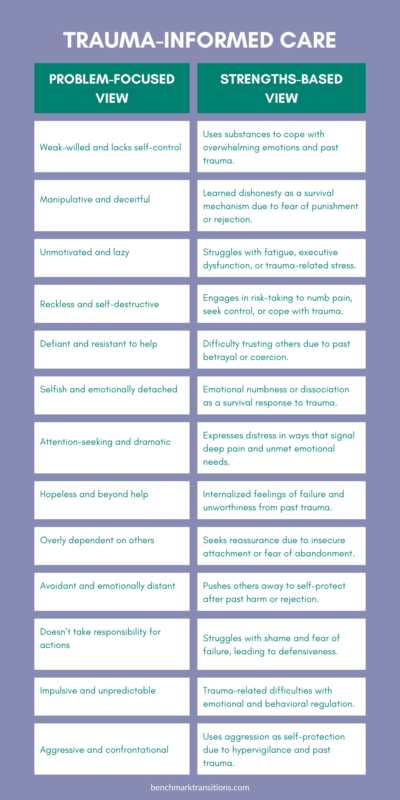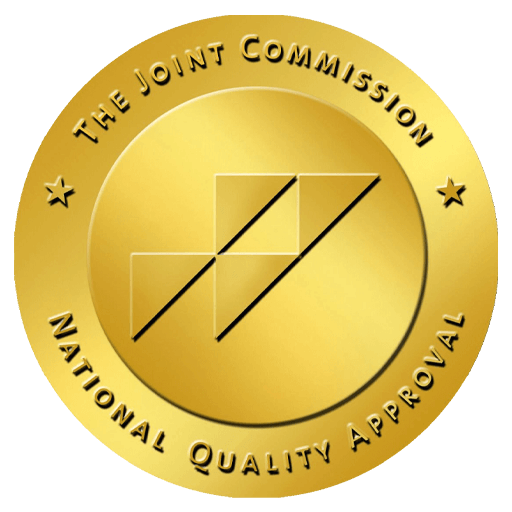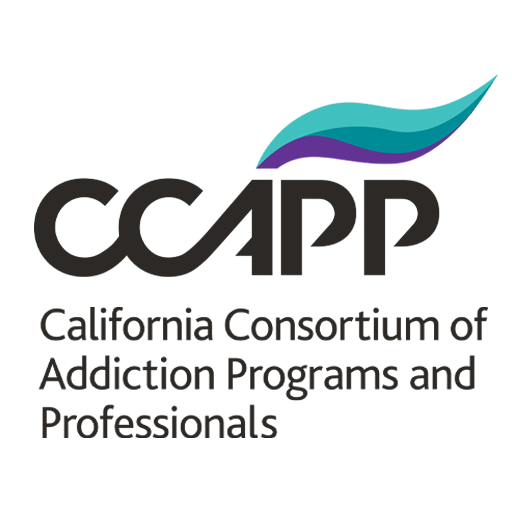When it comes to mental health and addiction treatment, one of the most critical shifts in recent years has been the move toward trauma-informed care. Rather than asking, “What’s wrong with you?” trauma-informed care shifts the focus to, “What happened to you?” This simple but powerful change in perspective helps providers understand that many people struggling with addiction, mental health issues, or other behavioral challenges have experienced some form of trauma that continues to shape their responses to the world.
At Benchmark Transitions, healing isn’t just about treating symptoms—it’s about creating an environment where people feel safe, supported, and truly understood. Whether you’ve endured childhood neglect, domestic violence, combat experiences, or any other deeply distressing event, a trauma-informed approach can help you regain self-esteem and independence.
What Is Trauma-Informed Care?
Trauma-informed care (TIC) is an approach that acknowledges the widespread impact of trauma and integrates this understanding into every aspect of treatment. It’s not just about offering therapy—it’s about creating a setting where clients don’t feel retraumatized by the very process of seeking help.
Imagine walking into a medical office with a broken arm, only to have the doctor aggressively twist it without asking about your pain. That’s how traditional mental health and addiction treatment can sometimes feel for trauma survivors—being forced into situations that feel unsafe, triggering, or disempowering. Trauma-informed care prioritizes physical and emotional safety, trust, and collaboration.
According to the Substance Abuse and Mental Health Services Administration (SAMHSA), trauma-informed care is built on four key principles:
- Realizing how widespread trauma is and how it affects people’s mental, emotional, and physical well-being.
- Recognizing the signs of trauma in individuals seeking care, as well as in staff members.
- Responding by integrating trauma awareness into every part of a program’s policies, procedures, and daily interactions.
- Resisting retraumatization, ensuring that treatment does not unintentionally replicate past traumas, such as through overly strict rules, punitive approaches, or lack of choice in treatment decisions.

6 Key Principles of Trauma-Informed Care
To put trauma-informed care into practice, treatment centers like Benchmark Transitions follow six guiding principles that shape how we interact with clients and structure our programs. These principles ensure that treatment is effective and compassionate, addressing both the symptoms and the underlying trauma that may be driving addiction and mental health struggles.
1. Safety
People need to feel physically and emotionally safe before they can open up and start healing. In treatment settings, this means creating an environment where clients don’t have to worry about judgment, harsh discipline, or being forced into uncomfortable situations. At Benchmark Transitions, this starts with a structured yet welcoming space where clients in detox and residential treatment can stabilize without fear, knowing that they are supported by professionals trained in de-escalation, trauma response, and compassionate care.
2. Trust and Transparency
Trust isn’t given—it’s earned. Many individuals entering treatment have experienced betrayal, broken promises, or unpredictable environments, making it difficult to trust others. Trauma-informed care emphasizes honesty and consistency, ensuring clients understand what to expect and feel confident in their treatment team. Whether in residential care, IOP, or outpatient services, Benchmark Transitions fosters trust by involving clients in decisions about their treatment, setting clear expectations, and ensuring that every interaction prioritizes respect, integrity, and follow-through.
3. Peer Support
Hearing “I’ve been there too” can be incredibly powerful. Trauma-informed care encourages peer support—individuals who have gone through similar experiences and can offer understanding, encouragement, and hope. In treatment settings, group therapy, alumni networks, and recovery mentors provide a vital connection, reminding clients that they are not alone in their struggles. At Benchmark Transitions, we incorporate peer-led support groups and encourage relationships that foster accountability and shared healing throughout all levels of care.
4. Collaboration and Empowerment
Many trauma survivors have felt powerless in their lives, whether due to childhood adversity, abusive relationships, or systemic injustices. Rather than dictating what treatment should look like, trauma-informed care ensures that individuals have a say in their recovery journey. At Benchmark Transitions, this means offering personalized treatment plans, goal-setting with therapists, and collaborative discharge planning to ensure clients regain control, agency, and confidence as they move through detox, residential, and outpatient treatment.
5. Recognizing Strengths and Resilience
Rather than seeing trauma survivors as “broken,” trauma-informed care highlights their resilience. People who have been through trauma often develop incredible survival skills, even if those strategies—such as substance use—have become maladaptive over time. Treatment should help clients recognize their strengths, whether perseverance, creativity or the ability to adapt. Benchmark Transitions focuses on building life skills, emotional regulation techniques, and self-efficacy, ensuring clients leave treatment with a strong foundation for long-term recovery.
6. Cultural Sensitivity and Awareness
Trauma doesn’t exist in a vacuum—people’s experiences are shaped by their background, culture, and identity. Trauma-informed care recognizes the impact of historical, generational, and systemic trauma, ensuring that treatment is inclusive, respectful, and responsive to each individual’s unique experiences. At Benchmark Transitions, this means providing culturally competent therapists, personalized treatment approaches, and a deep awareness of how factors like race, gender, sexuality, and socioeconomic status impact recovery.
Why Trauma-Informed Care Matters in Residential Treatment

When it comes to addiction treatment, trauma-informed care isn’t just helpful—it’s essential. Many people struggling with substance use disorder (SUD) have experienced significant trauma, whether from childhood, relationships, or the consequences of addiction itself. Trauma affects how people think, feel, and react, which means that treatment has to address more than just stopping substance use—it has to help people heal on a deeper level. Trauma-informed care is woven into every aspect of the experience in a residential setting, from therapy approaches to daily interactions. Here’s why it matters.
1. Punishment Reinforces Shame, Not Growth
Imagine walking into a place where every decision about your care is made for you, where you’re expected to follow strict rules without question, and where struggling is met with punishment instead of support. That kind of environment can feel suffocating, especially for someone with a history of trauma. That’s why trauma-informed care takes a different approach—it creates an environment where healing feels possible.
Take something as simple as breaking a rule. In a traditional setting, someone might be punished, lectured, or even kicked out. But what if breaking the rule wasn’t about defiance at all? What if it was a stress response, a survival instinct left over from past trauma? Instead of jumping to discipline, trauma-informed care asks, Why did this happen? And What can we do to help this person respond differently next time? It turns difficult moments into learning opportunities instead of sources of shame.
2. Trauma Can Look Like Resistance or Defiance
People in addiction treatment are sometimes labeled as difficult, manipulative, or unmotivated—but in many cases, these behaviors are trauma responses. Someone who shuts down in group therapy might not be disengaged—they may have learned that vulnerability isn’t safe. A person who reacts angrily when given feedback might not be defiant—they may have been conditioned to believe that criticism means danger.
Trauma-informed care trains staff to recognize these reactions for what they are: survival mechanisms. Instead of punishing or dismissing a client for being “resistant,” trauma-informed programs work to help them feel safe enough to let their guard down and engage in treatment.
3. People Need to Feel Safe Before They Can Heal
For many in recovery, feeling unsafe—physically or emotionally—is a familiar state. Whether due to past abuse, neglect, violence, or unstable environments, their nervous system may always be in high alert mode, making it difficult to trust others, stay present, or regulate emotions.
A trauma-informed residential program recognizes that creating safety is the first step to healing. This doesn’t just mean having secure facilities; it also means:
- A calm, supportive staff that doesn’t use intimidation or harsh discipline.
- Spaces designed to be comforting rather than institutional.
- Predictability in the schedule so clients aren’t thrown into situations that feel chaotic or triggering.
When people feel safe, respected, and in control of their experience, they are more likely to engage in treatment and do the deep work of healing.
4. Addiction and Trauma Are Deeply Connected
Substance use often starts as a way to cope with pain, fear, or overwhelming emotions. For many, drugs or alcohol provided an escape from memories, anxiety, or feelings of worthlessness. That’s why just removing the substance isn’t enough—if the underlying trauma isn’t addressed, the person is left with the same pain, but without the coping mechanism they once relied on.
Trauma-informed treatment integrates therapies that specifically help process trauma, such as:
- EMDR (Eye Movement Desensitization and Reprocessing) – A trauma-focused therapy that helps reprocess traumatic memories so they no longer feel overwhelming.
- Somatic Therapy – A treatment that helps release trauma stored in the body, reducing tension and emotional numbness.
- Mindfulness and Nervous System Regulation – Techniques that help clients move out of survival mode and develop healthier ways to handle stress.
By treating both addiction and trauma together, recovery becomes more sustainable.
5. People Deserve Choice and Control Over Their Recovery
For many who struggle with addiction, powerlessness has been a defining experience—whether from childhood trauma, abusive relationships, or the control that substances had over their life. Being forced into rigid, one-size-fits-all treatment can reinforce that sense of helplessness, making healing even harder.
Trauma-informed care ensures that clients have choices and autonomy wherever possible. This could mean:
- Having a say in their treatment plan.
- Choosing between different therapy approaches.
- Being able to take a break if they feel overwhelmed.
When people regain a sense of control in a safe and supportive environment, they begin to rebuild confidence, self-worth, and hope—key ingredients for long-term recovery.
6. Recovery is About More Than Just Abstinence—It’s About Healing
Stopping substance use is only the first step. True recovery means healing the wounds that led to addiction in the first place, rebuilding trust in oneself and others, and developing healthier ways to cope with life’s challenges.
Trauma-informed care doesn’t just treat symptoms—it helps people reclaim their lives. For clients and their loved ones, choosing a treatment center that truly understands trauma can be the difference between just getting sober and finding real, lasting healing.
The Benefits of Trauma-Informed Care

Shifting to a trauma-informed approach doesn’t just benefit clients—it also improves outcomes for treatment providers. When individuals feel understood, they are more likely to engage in treatment, experience fewer relapses, and build stronger relationships with staff and peers.
For clients, trauma-informed care:
- Helps them feel safe and heard rather than judged or shamed.
- Reduces feelings of isolation and builds healthy connections with others.
- Encourages self-empowerment and helps them regain a sense of control over their lives.
For providers, it reduces burnout and staff turnover, as it creates a more compassionate and supportive workplace culture.
Trauma-Informed Care for Addiction & Dual Diagnosis at Benchmark Transitions
A trauma-informed approach isn’t just a therapy—it’s a framework that shapes every aspect of treatment, from the therapeutic techniques used to how staff interact with clients. In a residential setting like Benchmark Transitions, trauma-informed care is fully integrated into the entire treatment experience, ensuring that individuals receive care that is safe, supportive, and responsive to their unique history.
1. Psychological Assessments to Whole-Person Care
The first step in trauma-informed care is understanding each client’s unique experiences. Every individual entering residential treatment at Benchmark Transitions undergoes a thorough assessment to identify past trauma and its effects on mental health, substance use, and behavioral patterns. This process helps clinicians create personalized treatment plans that address both addiction and co-occurring disorders, ensuring that underlying trauma isn’t overlooked. At Benchmark Transitions, we believe in treating the whole person, not just their symptoms.
2. Holistic Therapies That Support Trauma Healing
Healing from trauma requires more than just talk therapy. That’s why trauma-informed treatment incorporates a range of evidence-based and holistic therapies that help individuals process their experiences in a safe, structured way. At Benchmark Transitions, treatment may include:
- Somatic Experiencing helps release trauma stored in the body.
- Cognitive-behavioral therapy (CBT) reframes negative thought patterns.
- Dialectical Behavior Therapy (DBT) teaches emotional regulation and distress tolerance.
- EMDR (Eye movement desensitization and reprocessing) helps process traumatic memories.
- Mindfulness and grounding techniques to promote relaxation and self-awareness.
We combine scientific and holistic approaches to give you or your loved one the tools to address both the mind and body’s response to trauma.
3. A Supportive Living Environment That Feels Safe
In a trauma-informed residential program, healing doesn’t just happen in therapy sessions—it occurs in the living environment as well. Many individuals entering treatment have spent years in unstable or unsafe situations, which can make it challenging to feel comfortable, secure, or in control. Benchmark Transitions fosters a structured yet nonjudgmental transitional living environment where individuals can develop a sense of stability and trust.
The goal is to create a space where clients don’t feel retraumatized by rigid rules, punishment-based systems, or impersonal care. Instead, the focus is on consistency, respect, and individualized support, allowing each person to move through treatment at a safe pace.
4. Staff Trained to Provide Compassionate, Trauma-Informed Care
A trauma-informed approach is only as practical as the people delivering it. That’s why every staff member at Benchmark Transitions, from clinicians to support personnel, receives specialized training in trauma-informed care. This ensures all client interactions are empathetic, patient-centered, and free from harmful or triggering practices.
Rather than viewing behaviors as defiance, manipulation, or resistance, staff are trained to recognize them as adaptive survival responses that developed in response to past trauma. This understanding creates a culture of support where individuals feel heard, validated, and encouraged to engage in their recovery journey.
5. Integrating Trauma Healing with Addiction Recovery
Many people struggling with substance use disorder have a history of unresolved trauma. Addiction often begins as a way to numb emotional pain or cope with overwhelming stress. A trauma-informed approach ensures that both issues are treated together, reducing the risk of relapse by helping individuals develop healthier coping mechanisms beyond substance use.
At Benchmark Transitions, treatment isn’t just about getting sober—it’s about addressing the root causes of addiction. Clients who focus on dealing with their trauma alongside substance abuse are better equipped to build a stable, substance-free life.
6. Long-Term Support and Aftercare for Lasting Recovery
Healing from trauma doesn’t end when residential treatment is over. Recovery is a long-term process, and ongoing support is essential for maintaining progress. Benchmark Transitions provides comprehensive aftercare services, including outpatient programs, transitional support, and relapse prevention planning, ensuring that clients continue receiving care as they reintegrate into daily life. Benchmark Transitions bridges the gap between residential treatment and independent living, helping individuals stay connected, supported, and on track in their recovery journey.
Reframing Trauma Responses: A Compassionate Perspective
It’s easy to label certain behaviors as difficult, defiant, or self-destructive, but a trauma-informed approach encourages us to look deeper. Many problematic reactions are adaptive survival responses—ways a person has learned to cope with pain, fear, or instability. Rather than seeing these behaviors as intentional misconduct, a trauma-informed lens allows us to understand the underlying trauma, offer support, and create pathways for healing.
For example, someone who self-isolates may not be avoiding connection but trying to protect themselves from past experiences of rejection or harm. A person who lies or manipulates may have learned that dishonesty is necessary for survival in a chaotic or unsafe environment. Even aggression can stem from past experiences where fighting back was the only way to stay safe.
From Judgment to Understanding
A problem-focused approach often sees these behaviors as character flaws, leading to punishment, blame, or frustration. A trauma-informed perspective, or strengths-based approach, on the other hand, recognizes that these responses are often rooted in nervous system dysregulation, attachment wounds, or unprocessed pain.
- Instead of “They’re weak-willed and lack self-control,” → They may be using substances to manage overwhelming emotions because they haven’t yet learned safer ways to self-regulate.
- Instead of “They’re manipulative and deceitful,” → They may have learned that dishonesty was a survival tool to avoid punishment or shame.
- Instead of “They’re aggressive and confrontational,” → They may be stuck in a fight-or-flight state, seeing conflict as necessary for self-protection.
- Instead of “They don’t take responsibility for their actions,” → They may struggle with shame and fear of failure, making accountability feel overwhelming.
A Safe Space For Healing

Shifting our perspective to consider underlying trauma when supporting individuals struggling with substance use and co-occurring mental health conditions allows for more patience, empathy, and effective treatment. Instead of meeting challenges with shame or punishment, Benchmark Transitions emphasizes meeting each person where they are, offering stability, support, and the tools to build healthier coping skills.
If you or a loved one is struggling with trauma, addiction, or co-occurring disorders, Benchmark Transitions is here to help. Our trauma-informed residential treatment program offers compassionate support for true healing and transformation.
Contact us today to learn more about our trauma-informed approach to recovery.
References
Berring, L. L., Holm, T., Hansen, J. P., Delcomyn, C. L., Søndergaard, R., & Hvidhjelm, J. (2024). Implementing Trauma-Informed Care—Settings, Definitions, Interventions, Measures, and Implementation across Settings: A Scoping Review. Healthcare, 12(9), 908. https://doi.org/10.3390/healthcare12090908
Substance Abuse and Mental Health Services Administration. (2014). SAMHSA’s concept of trauma and guidance for a trauma-informed approach. HHS Publication No. (SMA) 14-4884. Rockville, MD: Author.
Xie H. (2013). Strengths-based approach for mental health recovery. Iranian journal of psychiatry and behavioral sciences, 7(2), 5–10.









